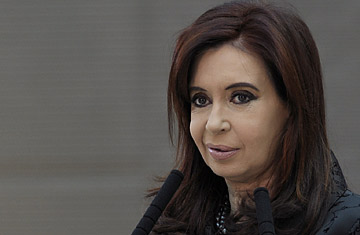
Argentine President Cristina Fernandez de Kirchner speaks at the Government Palace in Buenos Aires on June 13, 2011.
A surprise ban on print and internet ads for escort services is being lambasted by sex workers and legislators in Argentina as counterproductive to the new presidential order's proclaimed aim to combat the sexual exploitation of women. The edict, which goes into effect on July 18, represents "a giant step forward in the defense of women," said President Cristina Fernández, when she announced it last week. The ban will also block internet sites offering escort services. "We are going to move against sex ads on the internet, there are pages that will be deactivated," said the Minister of Justice, Julio César Alak.
But sex workers here disagree. "Banning the ads only drives us further into the hands of pimps and brothel-owners," says Jorgelina Sosa, a representative of AMMAR (the Spanish acronym for The Argentine Association of Women Prostitutes), a long-established group with 4,000 members that had been working with legislators here on a policy to protect sex workers from the kind of exploitation the ban is meant to discourage. "We are extremely upset," says Sosa. "We are being flooded with desperate calls from women asking us how they are expected to continue working. This ban will deliver these independent-working women straight into the hands of the mafia rings."
Prostitution is legal in Argentina, as long as it is practiced by individual sex workers. Brothels, however, remain against the law. Despite this, they are commonplace, often offering up young women forced into prostitution by human traffickers. President Fernández said the ban is a necessary tool in the battle against such exploitation rings. But Fernanda Gil Lozano, a legislator of the opposition Civic Coalition party (CC), which is at the forefront of the battle against the sexual exploitation of women, disagrees. "This ban is mere window-dressing," she says. "Human trafficking still needs to be seriously investigated and combatted by the government. We need a real law. A presidential ban fails to attack the root of the problem."
Banning advertising, argues Gil Lozano, does not get to the heart of the exploitation. Current legislation has to be changed to make it easier to prosecute pimps and traffickers, says the legislator. "When police raid a brothel today, if the girls are over 18, the officers ask the women, in the presence of the brothel-owners, if they are working of their own free will. The girls under such circumstances foreseeably enough tend to answer affirmatively and the brothel-owner is left off the hook. This has to change."
Free-speech advocates have also blasted the ban, enacted not by Congress but by a stroke of the presidential pen. "It is unconstitutional because it affects freedom of expression and the free exercise of a legal activity," said Martin Carranza Torres, a technology lawyer. AMMAR says the ban only underlines the lack of real will to battle the criminals who run rings, often allegedly in cahoots with the police. "There were 600 raids on brothels in the last year and the women are handcuffed and humiliated, but the men running them hardly ever go to prison," says Sosa.
President Fernández denied her ban seeks to punish sex workers. "We will never condemn any woman. In most cases, they cannot choose the life they live," Fernández said. But Sosa and her association are not convinced. "If the aim is to stop young women from being tricked into the sex trade, then they have to ban the ads offering false jobs for them, because those are the ads that the prostitution rings are placing," says Sosa, referring to the many ads promising young unemployed women a free ticket to the capital city of Buenos Aires and a monthly salary of roundabout 5,000 pesos (about $1,200) as secretaries or domestic help. "But once they arrive they are exploited by these criminals," says Sosa.
In Argentina these kind of pimps are called "husbands" and they rotate the women they have thus trapped around different brothels across the country to avoid detection, says congresswoman Gil Lozano. And it is not only women who succumb to these kind of ploys. "Prostitution is a diverse universe in Argentina today, affecting young boys and transvestites as well," says the legislator.
Yet some political observers see the ban not as an honest attempt to battle human trafficking, but instead as the latest swipe by President Fernández at her archnemesis Clarín, a mass-circulation paper that publishes some 200 sex ads daily. Announcing the ban, President Fernández, who is seeking reelection in October, said it would end the "hefty profits" some newspapers make from the ads.
The President and Clarín fell out three years ago when the paper sided with the nation's farmers during a long-running strike that eventually forced her to drop a big hike in agricultural taxes designed to finance her generous social policies. Since then Clarín, previously an unabashed supporter of Fernández, has focused on reporting on alleged corruption in her administration. The President has issued no comment on whether the ban has anything to do with her feud with Clarín.
AMMAR continues to hope that Fernández will hear their case against the advertising ban. "We've been asking for a meeting with President Fernández for a year now," says Sosa. "So far she has ignored us completely, but we hope she will eventually give us a hearing. After all, we are people too."
